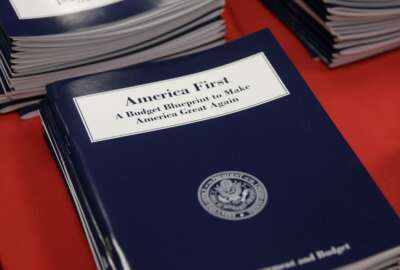
IRS needs to ‘be efficient,’ but budget cuts threaten customer service, cybersecurity
The Internal Revenue Service continues to think of ways to modernize its IT systems and navigate the dangerous waters of identity theft and refund scams, —,...
The last time some of the Internal Revenue Service information technology systems were updated, John F. Kennedy was president.
That’s why when April rolls around, IRS Commissioner John Koskinen and his department of revenue agents, IT folks, customer service employees and examiners get a little nervous.
“In a lot of ways we worry every filing season, that to some extent part of the system is held together with bailing wire, and there are more challenges and more outages every year,” Koskinen said during an April 5 speech at the National Press Club in Washington. “At some point our concern is if we can’t complete the upgrades and the modernization of it, the system is simply going to stop.”
IRS has been modernizing its system as quickly as it can. Koskinen said about 60 percent of the agency’s hardware and 28 percent of its software are out of date. He credited several employees and contractors with developing a method for translating old programming language into JAVA language.
“This was a big technological breakthrough,” Koskinen said. “In fact, it was so unique that the IRS is applying for a patent for this methodology.”
While the agency received some funding from Congress to help, the cost of new applications come out of the IRS’ standard operations and maintenance fund.
“That never seems to go up,” Koskinen said.
According to President Donald Trump’s fiscal 2018 budget proposal, the Treasury Department would be cut by about $500 million. About $239 million would come from cuts to IRS. Koskinen is scheduled to appear April 6 on Capitol Hill before the Senate Committee on Finance.
The commissioner said one of the things IRS is looking at is if $239 million had to be cut, how would it be done responsibly and reasonably, though he added the agency will also have to deal with $175 million in pay raises and inflation.
“We need to be efficient,” Koskinen said. “The idea that we can squeeze a lot more money out of the system after seven years of cuts just isn’t going to work.”
The IRS has lost nearly $1 billion out of its budget since 2011. Congress gave $290 million in extra funding for the 2016 fiscal year, more than half of which went to hiring 1,000 extra temporary employees to answer phones.
The commissioner’s speech was not so much a budget justification, but a realistic forecast of what the tax agency — and subsequently the government — could end up dealing with, if it once again is asked to tighten its belt.
For example, of the 17,000 net employees lost in the past six or seven years, about 7,000 of them were ‘key enforcement personnel,’ Koskinen said.
IRS last year audited about 1 million people, which is less than 1 percent of individual returns filed.
“For some people, that might sound like good news,” Koskinen said. “But a big part of the reason we do compliance activities is to make sure those folks who are trying to comply can be confident that the system is fair and everyone is paying their taxes. If I’m paying my fair share of taxes, but I see others who don’t and get away with it, I’ll be a lot less motivated to be tax compliant in the future.”
A 1 percent cut to the IRS compliance rate would mean a revenue loss of $30 billion, roughly the combined budget for the Environmental Protection Agency, Commerce Department and Social Security Administration.
“We don’t have enough people anywhere in the organization,” Koskinen said. “If we could just hold our own and quit losing people [that] would be a start. We do need more people, our IT groups are understaffed, enforcement; hopefully if you made [the tax code] really simple we’d have fewer enforcement issues. But in light of all the discussions going on there’s not a scenario I see that is going to markedly lower the burden we have and of course at the front end we’d have a significant challenge implementing whatever those changes are.”
While there’s been talk of tax reform, Koskinen clarified that the agency “does tax administration, not tax policy. Policy decisions are the domain of the administration and Congress. The IRS doesn’t have a dog in any fight about policy issues being considered in Congress.”
“There’s a good chance we could have a major piece of legislation to implement before long, if Congress passes a tax reform bill,” Koskinen said. “I’m an optimist by nature, so I’m hopeful that Congress will understand we need the resources to carry out any new mandates that are enacted.”
High priorities
Despite a shrinking budget and workforce, the commissioner said the agency has continued to look for ways to address the growing workload and modern day expectations.
One customer service tool being tested would “allow for secure online messaging between taxpayers and the IRS — to communicate about issues that come up on their return,” Koskinen said. “This will help us resolve these issues much faster than the current way, which is to send a letter to the taxpayer and then wait for a response through the mail.”
Koskinen said agency research shows customers want to communicate online with the IRS.
“I’m often asked why we can’t move faster to develop online accounts,” Koskinen said. “It’s something that will take time, because it has to be done carefully. A big challenge facing us is making sure these accounts are secure and well protected.”
Fraudsters and scammers are targeting IRS and taxpayers, even as the agency blocks those attempts at a record pace.
In 2016, the number of new people who reported stolen identities dropped by more than 50 percent, or roughly 275,000 fewer cases than 2015.
While those numbers are “stunning,” Koskinen said the flip side is that IRS was able to stop $6.5 billion in fraudulent refunds from going out to thieves — meaning the threat of identity theft is still out there.
“To stop identity thieves, the IRS has been working to improve our methods for verifying the identity of taxpayers using our online services,” Koskinen said. “Before we offer a fully functioning online account, we must have a strong authentication process built in, to protect taxpayers from identity theft. This may mean added time and extra steps for people, but it’s worth it to keep these accounts secure. At the IRS, there is no argument about how to balance convenience and security, because security is the highest priority. That’s how it has to be.”
As for cybersecurity, the commissioner said the agency approaches the battle from the perspective of always assume there’s more to do.
“When I say we’re under attack 1 million times a day, that’s not an exaggeration,” Koskinen said. “The actual number is three to four times that. It is a real battle. We are no longer dealing with individuals sitting on Miami Beach with an iPad trying to figure out how to hack into our systems or get a refund system, we are literally dealing with organized crime syndicates around the world.”
Money on the table
Koskinen’s speech comes days after a group of tax organizations submitted their “Ensuring a Modern-Functioning IRS for the 21st Century” framework to Congress.
The framework includes recommendations like granting all available authorities for the agency to hire qualified people, create an “executive-level” practitioners service unit at the agency, and allow immediate account access to client information.
Koskinen acknowledged the concern that preparers cannot do a lot directly with the IRS and their clients, but IRS is working to move them online with the agency.
He also said the agency is working with preparers and third parties to help stop scammers and ID schemers before they get too far, because they often red flag earlier than the IRS.
IRS also announced this week it would be launching the third iteration of its private debit collection program. Beginning this month, the IRS is contracting with four firms to collect on overdue tax accounts.
The four firms contracted for the program are CBE Group of Cedar Falls, Iowa; Conserve of Fairport, New York.; Performant of Livermore, California; and Pioneer of Horseheads, New York.
The IRS reports that nearly $400 billion in taxes go unpaid every year.
Copyright © 2025 Federal News Network. All rights reserved. This website is not intended for users located within the European Economic Area.
Related Stories





